Story By Scott E. Raymond
Photos By Lindsey Janies
“One of the most important things that happened to me was that I left Lake Charles, then I came back,” says Marshall J. Simien, Jr., 54. “You never know how cool this place is until you leave this place and come back to it. When I came back, I came back with a different perspective, and with a vision of what Lake Charles is and what it can be.”
Beginnings: Home Grown, Then Off To LSU Law School
When I meet attorney Marshall Simien at his spacious eleventh floor office overlooking the lake and downtown Lake Charles, he greets me with a warm smile and a handshake. Dressed business casual, he seems relaxed. We walk into his conference room and I spot a familiar photo of the Lake Charles City Council taken while he was a councilman.
“I think I took that photo,” I say, smiling.
“I think you did,” he replies, smiling back.
To better know Marshall Simien, you need to know his background and the obstacles he overcame to get to where he is today.
Simien’s father worked as a laborer at the plants across the river and his mother worked as a nursing assistant. He grew up in the northern part of Lake Charles with four siblings and attended public schools.
Simien says one of his earliest experiences in his formative years as an African-American growing up in the 1960s came during the integration of public schools, which took place in the third grade when he was bussed from Cherry Street Elementary to Rosteet Elementary.
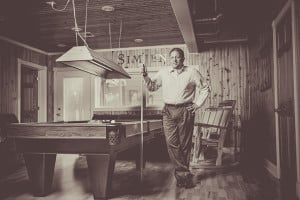
When Simien went to McNeese majoring in Government, his father had him work with him at the plants and, he states, instilled in him the importance of a strong work ethic.
“He never wanted us to get too comfortable with money, and to understand what it took to make it,” Simien says.
Simien says he went to law school, not as his first choice, but because of a brick wall called physics while studying engineering.
“I initially wanted to get out of college and make money immediately. I went into engineering because that was the highest paying field out of school, and then I ran into physics. The theory of relativity actually put me on a different path (chuckle)!”
When I ask him if there is any special kind of ethical code he lives by, he talks about his time in law school when he was involved in moot court competitions where students argued different sides of an issue.
“My team wound up going to nationals — we were in Los Angeles,” he says, … “(and we came) in second in the nation and won an award named for Charles Hamilton Houston. He was Dean of the School of Law at Howard University where (U.S. Supreme Court Justice) Thurgood Marshall (was) educated.”
Simien says he researched the life of Houston and embraced his philosophy that a lawyer should use his talents to make society better.
“That’s pretty much what drives what I do,” he says.
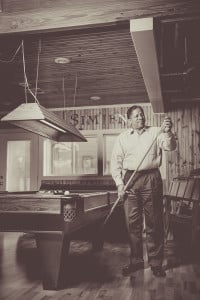
“We first met in college. Back then I had just joined a fraternity, so I was one of those ‘bad’ boys and she was a good girl (smile)! When I went to law school, she was in grad school at LSU too, in psychology. I saw her in the book store one day, went up to her and said, ‘This may sound like the oldest line in the book (but) haven’t we met somewhere before?’ And she said with surprise, ‘We met in school.’
“We started dating, and we dated for five years before we got married, and went another four years before we had our first child. So we got to know each other very, very well.”
Simien received his bachelor’s degree in government from McNeese State University and his law degree from the Paul M. Hebert Law Center at Louisiana State University. After LSU, Simien served as a judicial law clerk to current Louisiana Supreme Court Chief Justice Bernette Joshua Johnson. Following his service as a judicial law clerk, Simien entered private law practice, eventually becoming a partner with a New Orleans law firm. In 1999, Simien returned to his hometown of Lake Charles and established the Simien Law Firm.
An Appointment To The Port Board By The Governor
In 2003, Marshall Simien was appointed by Governor Kathleen Blanco to the Port of Lake Charles Board of Commissioners. He says this experience “was the first time I saw the scope and breadth of what we call Southwest Louisiana.”
“While I was on the Port (Board),” he says, “I didn’t know anything about ports or water. But when I got appointed, they said they needed people who understood business.”
Simien recalls attending the new Port Board’s first Ports Conference in San Diego and that it served as a positive springboard in talking with others about the strength of the Port of Lake Charles and the positive things that were happening there. He says that through business meetings they held at the conference it became clear to him that, with the pipeline infrastructure already in place, Southwest Louisiana was set to be a key location for the liquefied natural gas (LNG) business.
“(At a meeting) with what would become a future Port client we pulled out the pipeline maps and saw our area and all the infrastructure that was in there to deliver this (natural) gas to anywhere in the country, (and) we started realizing we were well positioned for (the LNG business).
“Out of that … back in 2003, we didn’t see all of (the current LNG business) coming, but that’s probably where a lot of (it) started.”
Serving On The Lake Charles City Council
On July 1, 2005, Simien was sworn in as the Lake Charles City Councilman for District A. His inroad into politics came after initially saying he was uninterested in pursuing a seat on the City Council. It was only after his wife, Paula, nudged him to take another look at the opportunity that he moved forward.
“One day, I was talking to my wife and complaining about something, and she told me, ‘You can’t complain if you’re not willing to do something about it.’ So I went and looked over the whole district, and I realized the district had some serious assets, including the beach, the lakefront, the Calcasieu River, English Bayou … Kayouchee Coulee.
“I said, ‘Wow, there’s a lot of water here.’ And then having served on the Port just those two years and having learned how valuable those kind of resources are, I started realizing there was a lot that could be done in that area.”
Simien says that two months after he took office, Hurricane Rita hit Southwest Louisiana in September of 2005. Recovery began and getting infrastructure back on-line was a must. A bond issue started being discussed.
“Could you imagine how far behind we would be today if we hadn’t done the bond issue,” Simien says.
Simien elaborates:
“I remember when the ($90 million Bond Issue) projects were first approved and we came back for re-election, (Mayor) Randy (Roach) took … heat for … the palm trees being out (on the Lakefront Promenade). They didn’t realize what it took to move all of (these projects) out. The best thing was that when the national economy tanked in 2008, all these industries had all this cash and were looking at expansion projects. Everybody else was boarding up everything. They came out here and (the) Bond projects were blowing and going and there was a momentum already in place just by them seeing what we were doing on the Bond side. That probably drove some of the decisions for the expansion projects in this area.”
Marshall Simien talks about his eight years on the City Council and some of the accomplishments he is most proud of:
“What I was proud to see was … out of that adversity, especially with Hurricane Katrina and what happened in New Orleans, our whole community came together. Everybody. We were in the meetings and everybody was rolling up their sleeves and saying, ‘Let’s get to work!’ There were no boundaries: no municipal boundaries; no political boundaries. We just came together and said, ‘We just got gut punched. We’ve got to find a way to recover from this.’
“One thing I learned was that everyone wanted the same things, they (just) had different ways of going about it. When we opened up the lines and communicated well with each other (as council members), we were very, very efficient in how we got things done.
“For my area, the northern part of Lake Charles was economically depressed and we started cleaning (it) up. All these abandoned buildings … we started cleaning them up and we started seeing people reinvesting in the community, which I thought was great.
“There were abandoned, dilapidated buildings in the district and we went in and used our condemnation processes and held these property owners accountable. A lot of people who live next (to) and around these places responded and started reinvesting in their own homes when they saw that (the council district was) taking care of (its) business. The City, along with the Corps of Engineers, rolled out a plan to revitalize the entire area over the long term.”
Learning From Political Defeat
After serving two terms as City Councilman of District A, Simien ran for the council seat a third time and was defeated in the 2013 election. He discusses the defeat and what he learned from it.
Says Simien:
“There was an issue with properties where horses were housed (in the city) that captured most of the headlines, but I think there was more to it than that. I realize that change, even good change, is scary to people and things changed so much in the area — not just because of hurricane recovery and cleanup, but everything else. Maybe I didn’t do a good enough job communicating with everyone, especially discussing in detail what the changes were, how it all fit, (giving) them a forewarning of what was coming and, most important, listening directly to their voices and their concerns over what was happening.
“(The actual housing of horses) wasn’t a prime issue for me when I was on the Council. We received complaints about usage by a couple of property owners that affected other adjacent property owners. We tried to work directly with the property owners to get it resolved, but when that didn’t work, we just enforced the laws that were already on the books. Because you cannot pick and choose whom the law applies to, that affected a lot of other people, and it was the kind of change from a way of doing things that caught people’s attention.
“I just think the whole change … you know … the first part of (the) Enterprise (Boulevard Extension) came into an area that was already populated, so there was an issue there. But then, (there was) also the other part (of the Extension) in the places that weren’t populated and there were no issues. It was such a large scope project that people didn’t expect that kind of change, so there was some push-back on it. Nowadays, people say it was such a great project and want it completed.
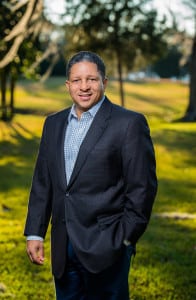
“And then Enterprise started coming in. At the time, we had re-election. (With) Enterprise, (we) had just cut the ribbon on it, but some people didn’t understand the whole scope of it yet.
“After I got out of office, people said, ‘Wow, this really wasn’t a bad thing.’ But at the time, when people were going through change … some people took the opportunity to misrepresent what that change was and, unfortunately, a lot of people got caught up with it. But also, a lot of people just assumed that the entire City Council would automatically get re-elected and they stayed on the sidelines.
“There was no mayor’s race, so there was a low turnout. At the end of the day, I can only hope people respect the fact that I tried to do something positive for our community.”
Serving On The Calcasieu Parish Police Jury
In December of 2014, Marshall Simien was unanimously appointed by the Calcasieu Parish Police Jury to fill the unexpired term of the late James Mayo. Simien explains why he felt driven to serve and fill out the term.
“I knew James very well. He talked to me when he first wanted to run for the Police Jury (about) just what to expect. I knew what he wanted (for the district), and it was important to me that that legacy continued. The area I lived in needed some immediate representation. We were in the start-up of this economic upswing and didn’t want to be left behind trying to catch-up. So I went in and filled out his term for a year.”
Public; Community Service: “… A Big Part Of My Fabric”
I ask Simien what has driven him to be so involved with public service and service on many civic organizations.
“When I grew up, we were the type of family (that), when we would cut our yard, we’d go by the neighbors’ yards and cut theirs. My dad would cook turkeys for Thanksgiving and all the neighbors would get turkeys and we’d cook all theirs and we’d exchange different things. So public service, especially community service — service to your neighbors — has always been a big part of my fabric. I have a very, very busy law practice and I have a young family that needs a lot. But if you manage your time and do things for the right reasons, it all comes together.”
A Vision For The Future Of Southwest Louisiana
My interview with Marshall Simien moves to the topic of the historic industrial expansion underway in Southwest Louisiana. I ask Simien if he thinks the GO Group’s (Southwest Louisiana Task Force for Growth and Opportunity) overall approach in focusing on this expansion is going in the right direction.
Says Simien:
“I think so.
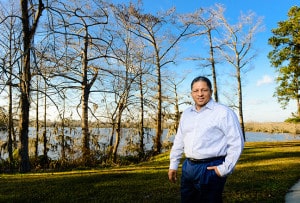
“‘The trick is going to be: How do you grow a city but keep all the things that make it special in place, or even enhance them? That’s going to be the fine line that needs to be walked.’
“I think Randy (Roach) has been doing that. Even after hurricane recovery, we were building a city but still managing a town. The things that were special to us, we enhanced. Riverside is a true Louisiana sanctuary. When Millennium Park burned down, we built a better park. The Promenade on the lakefront (is) one of the greatest places that we have, and as we continue to grow, that’s going to be the balance that we have to strike.”
I ask Simien how we as a city, parish and five-parish community can manage this growth in such a way as to maximize the best outcome.
“I remember when (I was) on the Port (Board), one of things that we always looked at was whatever you have coming in place, how do you leverage that to grow,” says Simien. “Every dollar that comes into the community is supposed to circulate about seven times. I knew from the hurricane that a lot of the money was going to come into the city, especially when we did the city charrette and we said, ‘How do we get a good return on the investment for the tax payers? What do we put in place that is going to spur further development that’s not even anticipated for the long-term?’
“I think that’s what you’re seeing here. When we talk about the billions of dollars in industrial expansion, there is also housing, restaurants — you are seeing that already — you’ve got traffic concerns. How do you leverage those types of things? I think the key is going to be that we’re going to have to tie our educational system — which we are already doing with Sowela and McNeese — into that to leverage some of the industries that you see.
“Silicon Valley started as a computer tech (area) where you had a bunch of great computer minds, and they have formed a whole industry over there. We have some of the top-notch industries in the world right here facility-wise. We should have a research and development engine at McNeese where you can bring in the best and brightest and do theoretical applications and actually go right here to the plants and apply them. (We should) tell all these companies that are coming to hire our young people that you can’t just come here during their senior year, you should have an established presence and start giving them internships in their freshmen, sophomore and junior years.
“The one thing the United States is the best at is we are the ones who research and develop everything. That’s a whole market that is untapped (here in Southwest Louisiana). (A total of) $97 billion can be leveraged into who knows what for the next 25, 30, maybe 50 years!”
Simien says that another important aspect in moving forward with the expansion successfully is developing the area into a quality-of-life location that meets the needs of the various demographic groups, including “the type of life-style that the young professionals, workers and families are going to gravitate to.
“As we develop our area — and I’m talking specifically about the lakefront, the downtown and all these other areas that are now very hip — we have to (keep) in mind that it’s not just a family group, but that you’ve got young professionals, workers, students; you’ve got empty nesters. You’ve got to take into account the inclusion of everybody.”
“This City … A Beacon For Everything Else”
At a police jury meeting last year, Simien said he would not be running for police juror in the next election; he was going to run for mayor.
“We have a very, very special opportunity to make something very, very special (in Lake Charles),” Simien says. “As a father with children, I really want my children to have a legitimate opportunity to (later) say, (they) want to either come back to Lake Charles or want to stay in Lake Charles, live and raise (a) family because there’s no place that could compete with it. There are a lot of dots out there that can come together.
“I think this is a time for us to start coming together as a people, to have full and meaningful participation by everybody, so that we’re all accountable in building the city that we want. And I think that’s going to make us a generational powerhouse.
“I remember somebody (telling me), ‘Politicians make decisions based on the next election,’ and I told them, ‘Well, statesmen make decisions based on the next generation.’ I prefer to see myself as a statesman because I’m thinking, right now, the cycle that (the community is) in is more generational than (the) four-year (cycle of elections), in any case.”
When asked what he is most proud of, both personally and professionally, Marshall Simien has the following to say:
“Personally, I’m most proud of the fact that I’m the first person in my family to go to college,” he says, “to have graduated college; to have graduated law school — especially LSU. That was not an easy ride. I clerked for a judge who now is the Chief Justice of the Louisiana Supreme Court. I have this unique number of mentors in my life. I worked for a firm that did nothing but Fortune 500 work, and then I started my own firm. Just the fact that, statistically, here’s a kid who grew up in north Lake Charles, went to all the (public) schools — Molo, Washington and everything else. Statistically, I’m not supposed to have achieved that.
“There was nothing that was special about me, except that I had a community that believed in me and got behind me (and) I had a family that really encouraged me. When I was in college, even my parents couldn’t tell me what to expect because nobody had been there. All they could do was encourage me. And the fact that I’m here now: I have a great family, this law firm; I’ve contributed to my community. I can look at myself in the mirror at night, and it’s okay. And, hopefully, when I get to the pearly gates, I get a, ‘Well done; come on in.’ When you think about it in those perspectives, it really gets overwhelming.
“I’m a believer in a strong Lake Charles,” says Simien. “Having served on all these boards, I do get out into Southwest Louisiana and I understand Southwest Louisiana. But I’ve always thought that a strong Lake Charles was good for a strong Calcasieu Parish, for a good Southwest Louisiana. I think that we are there, but I think that we still have some internal things to do. We need to come together more as a community, and I want to build that bridge because I think there’s a lot of strength in what we do.
“This is how I describe myself,” Simien says, “I think there are two theories on economic development. One is to get a bigger piece of the pie. The only problem with that is it presumes that is as big as the pie is going to get. In order to get a bigger piece, you’ve got to cut into somebody else’s piece, which creates friction.
“The second theory, which I subscribe to, is just make the whole pie bigger. In order to do that, you need a bunch of ingredients. We’ve got ingredients all over the place now. We might just need a good cook to put all that together. I want to put on an apron, because I think — economically, socially, educationally, and as a family unit — we can come together, and this city can be very strong and be a beacon for everything else.”



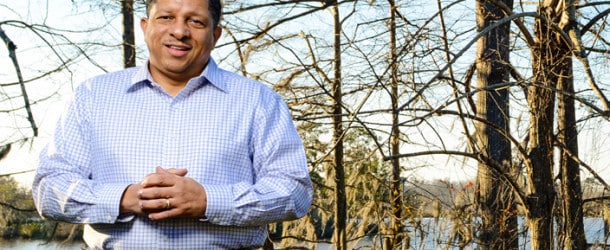











Comments are closed.